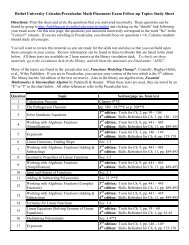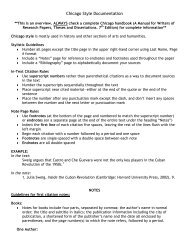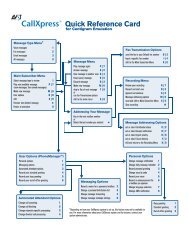here - College of Arts & Sciences - Bethel University
here - College of Arts & Sciences - Bethel University
here - College of Arts & Sciences - Bethel University
Create successful ePaper yourself
Turn your PDF publications into a flip-book with our unique Google optimized e-Paper software.
imagining could be made in a way I could vote for them include things like racism,<br />
bigotry, or hate are good...so that's a big surprise.<br />
Relative importance <strong>of</strong> presentation/communication skills to the critic in decision-making<br />
:<br />
Good vocal variation and presence in the round can make arguments easier to understand<br />
and more persuasive. Eye contact and gestures are not important to me. I would rather<br />
have teams focus on a few issues so that arguments can be developed well and compared<br />
to one another, but if a team spreads with a bunch <strong>of</strong> positions for strategic reasons that's<br />
fine. All that I ask is that at some point you make some choices instead <strong>of</strong> constantly<br />
expanding the round. The LOR can make whatever strategic choices she wants. As long<br />
as the positions the MO doesn't cover were initially covered in the LOC they can talk<br />
about them again. However, I don't think the LOR should be making new arguments.<br />
After a few seconds I would prompt them to begin, and a few seconds more I would start<br />
time. If t<strong>here</strong> are a lot <strong>of</strong> papers for everybody to get in order I would allow for a little<br />
more time, but 1520 seconds is probably too much. I will listen to the end <strong>of</strong> an<br />
argument if it finishes a second or three after the end <strong>of</strong> the speech time but 10 to 15<br />
seconds is way too long. I will allow new arguments if the other team does not make a<br />
point <strong>of</strong> order on it. I think a PMR can make arguments about which arguments are new<br />
in the LOR and why I shouldn't allow them. However, if a team makes two or three<br />
points <strong>of</strong> order on a particular position or argument I won't make them keep standing up<br />
as long as it's being discussed. That is because while I generally feel like I shouldn't do<br />
the work for the debaters <strong>of</strong> deciding which arguments are new and which aren't I also<br />
don't want a team to feel like they have to interrupt their opponents 15 times in 5 minutes.<br />
Relative importance <strong>of</strong> on-case argumentation to the critic in decision-making:<br />
I've come to appreciate creativity in the construction <strong>of</strong> case much more over the past two<br />
years or so. Both in the content and form, I enjoy teams who take risks and try something<br />
new. Of course, that doesn't always mean I'll vote for you if you do that, but I'll be much<br />
more interested in the round and I honestly think that makes a difference for critics. If a<br />
gov team wants to run a fact or value case they're going to have to explain very clearly<br />
how I am to evaluate the arguments and weigh the round. Opp teams should either<br />
respond to the gov on the gov's terms or should provide a justification for not doing so. I<br />
think plans and counterplans should be presented with enough time to clarify text. If a<br />
team doesn't present it until protected time but still allows a clarification that should be<br />
fine. Performance or kritikal gov cases are fine, except that you run the risk that I'm a<br />
little slow and don't get it. Then again, that's sort <strong>of</strong> always true. And really, I like the<br />
crazy, I'm not going to lie. I like impacts to be as specific as possible. If they're going to<br />
be about nuclear war or the environment or the economy that's fine, just tell me why<br />
those things are important and how they should be evaluated in the round. I think huge<br />
impacts and more realistic impacts, just so long as they're explained well. If two sets <strong>of</strong><br />
impacts are being compared and both are explained equally well, I suppose the huge<br />
impacts would be better. In<strong>here</strong>ncy is <strong>of</strong> minimal importance to a gov policy case, and<br />
only important at all if the opp makes it important. Cases should be structured. Or not,<br />
82
















